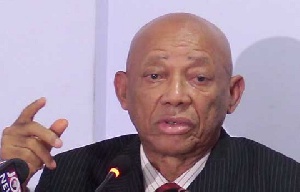Former Commissioner for Human Rights and Administrative Justice, Justice Emile Short, has called on government to revive the constitutional amendment process describing the 1992 constitution as flawed.
According to him, government needs to address certain provisions including the provision that majority of ministers must be appointed from parliament, and the excessive powers wielded by the President.
Justice Short was speaking at the launch of a research report and a video documentary on the RTI journey in Ghana to mark the international day for universal access to information by the CDD.
He said “I am urging the government to revive and resuscitate the constitutional amendment process. The constitution we have is flawed in so many respects. And we need to address certain provisions. For example the provision that government can appoint the majority of ministers from parliament. That has rendered very weak parliamentary oversight of the executive."
“That provision has to be looked at critically. And then the excessive powers of appointment given to the president which has really made our politics so decisive. Both parties may not want to change it because they all want to exercise control. The opposition is in the wings waiting so they could also enjoy when it’s their turn to takeover. So the responsibility lies with civil society to make sure that some of these changes are made,” he lamented.
Justice Short among other things also called for the formation of a civil society group aimed at ensuring the swift passing of the ‘conduct of public officers’ bill”.
He said “I only want to make two points. I spoke about the conduct of public officers bill which I said is an extremely important piece of article in our legislation and I want to suggest that we also form a coalition with regard to this particular bill, it’s so important.”
“Just as we have a coalition for the right to information, may I respectfully suggest that we have a coalition also not only for the speedy passing of the resolution but before that, to ensure that effective provisions are contained in the legislation. Because not all the provisions meet my expectations.”
He explained “the bill contains a provision which says that where you see yourself in a situation of conflict of interest, you must disclose your interest, but you must also state that you have recused yourself, that is a provision I think we should remove.”
“Let’s ensure that we have effective and proper provisions in the bill before it is passed,” he noted.
General News of Tuesday, 1 October 2019
Source: starrfm.com.gh

















